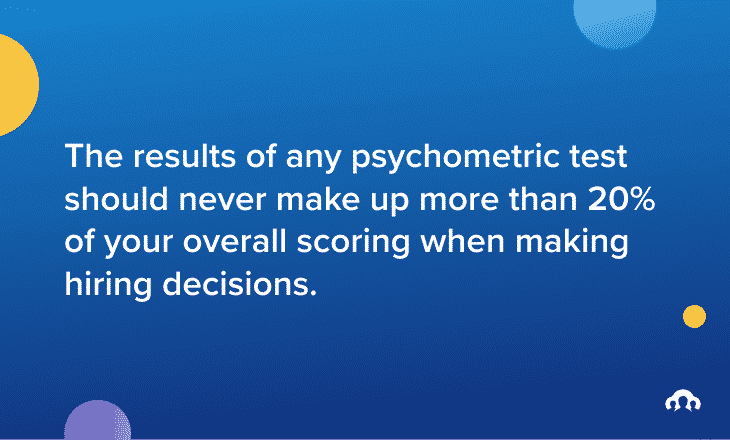Every recruiter wants to find the best candidate for each vacancy, and on the surface using a psychometric test for recruitment can seem ideal. But scratch below the surface, and you’ll realize that psychometric testing is far more complex than just checking out a candidate’s abilities.
There are many different types of psychometric tests available to hiring managers, but the quality and depth of tests vary considerably. Hiring managers need to fully understand the scope and depth of each psychometric test for recruitment before using them in their candidate selection process.
However, questions arise surrounding the impact of psychometric tests in the recruitment world. For one, what do psychometric tests do? What do the results show? What are psychometric tests? And are psychometric tests beneficial to recruitment? Today’s post is going to define, explore, and assess all things psychometric testing so that you, as a recruiter or hiring manager, can utilize these tools with impact.

The word-y answer is: a psychometric test for recruitment is a standard questioning system based on measurable norms to quantify a candidate’s mental capabilities and behavioral style.
In plain English, a psychometric test is a way of measuring the personality traits and mental elements of an individual along with their cognitive capability. When used for recruitment, this can show hiring managers whether a candidate is suitable to the role, company, and company culture.
Psychometric tests have been formed on both scientific and psychological research, studies and results. The aim is to provide a reasonable guide to how a candidate will handle specific responsibilities and situations in the work environment.
With thorough understanding, a psychometric test for hiring and selection can be a powerful tool in your recruitment and selection process. Without detailed understanding, subjecting a candidate to a psychometric test for recruitment purposes can be unfair and actually encourage bias. It’s also just a waste of time and money if the hiring manager doesn’t fully appreciate the results. This recruitment method should be used with a clear purpose, rather than to simply add something to your recruitment strategy.
There are different psychometric tests for recruitment that suit the key criteria of different roles. You must ensure that you choose the right test for the vacancy you’re interviewing for.
What can a psychometric test show when used in recruitment?
A psychometric test for recruitment can give you insight into many aspects of a candidate, including:
A natural aptitude for specific skills like:
- Ability to do complex figure work
- Working with words and being able to read/prepare finely detailed documents
- Well defined spatial skills
- Attention to fine detail (alpha or numeric)
- Ability to focus for long periods of time without deviation
- Ability to do repetitive tasks accurately over and over again
Natural leadership skills, and if they’re:
- An organic leader who’s inclined to spontaneous open-door type policies
- A mechanistic leader who thrives best under strict rules and structures
- A classical leader who prefers power-based, autocratic structures
- A democratic leader who prefers to involve others and work in a team structure
- A delegative leader who prefers to operate from behind the scenes
Natural personality traits like:
- Ability to remain calm and rational under pressure
- Ability to make quick decisions in stressful or crisis situations
- An innate desire to help other people
- Naturally outgoing and people-orientated
- Naturally combative or confrontational (making excellent debt collectors)
- Naturally persuasive and can convince or motivate other people
- Prefers a number of different tasks in their working day
- Prefers to specialize in only one or two tasks
- Easily distracted (people who are easily distracted are excellent at multi-tasking)
These are just a few of the significant traits a hiring manager would be looking to identify when they use a psychometric test for recruitment. But being able to interpret the results accurately is vital as is indicated in the last bulleted point.
What can psychometric test results show?
Let’s look at an example.
Imagine a candidate took a psychometric test and their results show they are easily distracted. This candidate could then be put aside because it can appear to be a ‘negative’ trait.
But if you’re looking to fill a position on a busy shop floor, hectic call center, inbound sales center, or a busy checkout point – this is a valuable trait. If the candidate’s score was average or better on attention to detail, they’d thrive in a very busy environment, and they won’t forget to get back to customers or do admin functions.
Are psychometric tests worth it in recruitment?
Psychometric tests function fabulously, but only when you understand how to read the results. What could be seen as something negative in one role will be a massive positive in another. It’s about using the criteria that you know the test will unleash, and weighing up the importance of each element when reflecting on the role description.
If you want to include psychometric tests for recruitment, training, and accreditation for hiring managers is advisable. Otherwise, outsource the testing and ensure that there’s a consultant who’ll fully understand your requirements and then analyze each psychometric test for recruitment purposes for you.
It’s important though to note that no psychometric test is foolproof and psychometric tests for recruitment can yield incorrect or inconclusive results. Therefore, make sure you use psychometric tests alongside other recruitment methods and strategies.
Get more articles like this, delivered right to your inbox
Get the MidWeekRead
Only great content. Unsubscribe at any time.
How do psychometric tests for recruitment work?
You can opt for outsourcing to an assessment center where the candidate will be taken through the whole range of psychometric tests you’ve requested. Another option is to manage each psychometric test for recruitment in-house by partnering with a company that offers testing online.

That way you buy some credits upfront or pay a monthly retainer and have access to a range of psychometric that you can use. Candidates log in to the site with a unique password, and the test results are sent directly to you for analysis.
Can psychometric tests for recruitment be wrong?
Whether you outsource to an assessment center or conduct psychometric tests for recruitment in-house, results can be wrong.
The main reason for a skewed result is that the test wasn’t conducted correctly or under ideal circumstances. Maybe the candidate wasn’t prepped properly, or the environment was unsuitable. This is the case for many different tests both in and out of recruitment, so it’s worth considering these risks and putting strategies in place to minimize the risk.
Other reasons for skewed results of a psychometric test for recruitment could include:
- The candidate willfully tried to alter the test results (people sometimes try to give the answers they think the hiring manager wants).
- The candidate was under the influence of a substance when they took the test (this can include alcohol, drugs, or medication for any sickness or chronic condition).
- The candidate is suffering from severe depression or has just experienced some type of personal trauma that’s impeded their concentration.
- Online psychometric tests can be affected by poor connectivity, but in that case, the result will almost always be inconclusive).
When to use a psychometric test for recruitment
Using a psychometric test for the recruitment of every vacancy you have is a waste of time and money. The results of any psychometric test should never make up more than 20% of your overall scoring when making hiring decisions.

Other influencing factors should be the candidate’s CV and their experience, past work references, how the candidate presented themselves during interviews, and the candidate’s qualifications. Remember, someone might have an aptitude for doing complex figure work, but if they have no formal training, it’s unlikely that they’ll be good at the job.
A psychometric test for recruitment works well when you’re:
- Hiring high volumes of people to perform the same job, for example, call center staff.
- Highly specialized positions, particularly of a technical nature, where doing the job properly is the only option (like in IT or repair centers).
- Hiring senior management and executives so that you can identify if their management style suits your organization.
- Hiring entry-level candidates who have no prior working experience; lack of skill often makes young candidates think they’ll do well at a task when they’re actually inclined to something completely different. A psychometric test for the recruitment of a junior employee can help you place them in a department where they’ll flourish rather than fail.
How to make the most out of psychometric tests for recruitment
Never use psychometric tests randomly and without prior planning. Decide upfront whether the job opening validates a psychometric test for recruitment and placement. If it does, decide while you’re compiling the job description and interview scorecard what information you want from the psychometric tests.
Always ensure that you use accredited psychometric tests for recruitment purposes because they can open your company up to accusations of unfair hiring practices or unfair bias. Each candidate’s personal circumstances must be considered before they’re subjected to a psychometric test for recruitment to ensure your company stays on the right side of the law.
Also, you must confirm that psychometric tests for recruitment purposes are available in all official languages recognized in your country. Even if the predominant language is spoken in your company is English, and the candidate can speak English! Labor law will usually deem it unfair if you didn’t give the candidate the option of taking the psychometric test in their home language.
Skills assessment tests where you can check English spelling, keyboard skills or basic numeracy are different from psychometric tests for recruitment, so the home language rule doesn’t apply.
Finally, before you sign up with any psychometric service provider, ask for proof that their testing methods are approved by the relevant health professions council in your country or state. Using a psychometric test for recruitment purposes that have no official approval can land your company in hot water in many countries and states.
When it comes down to it, psychometric tests can really enhance your hiring process. When used correctly, you can better your quality of hire metrics from the get-go, and feel assured that you’ve picked the right candidate for the open role. However, it’s crucial to understand the language of the psychometric test, interpret the results, and analyze the data with other potential candidates.








